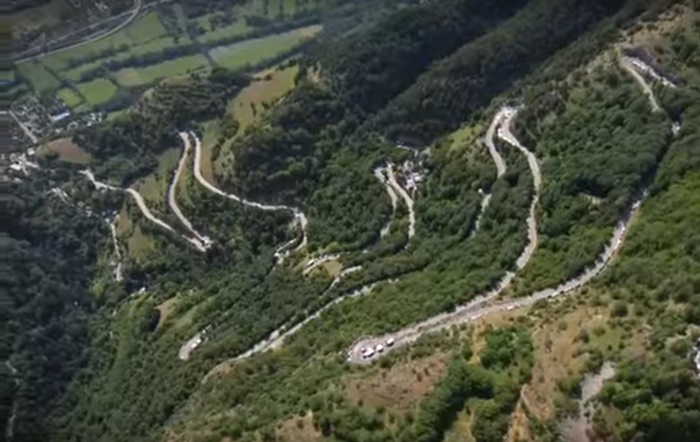
If the Alpine leg were a solid object, it would presumably be a bodily appendage made out of cheese. But I don’t mean that. I mean the three key Tour de France stages that took place in the Alps.
Into the mountains
The first mountain stage of the Tour de France showed what a phenomenally good cyclist Julian Alaphilippe is and also why he’ll probably never aim to win a Grand Tour. There was simply too much monstering from the Frenchman.
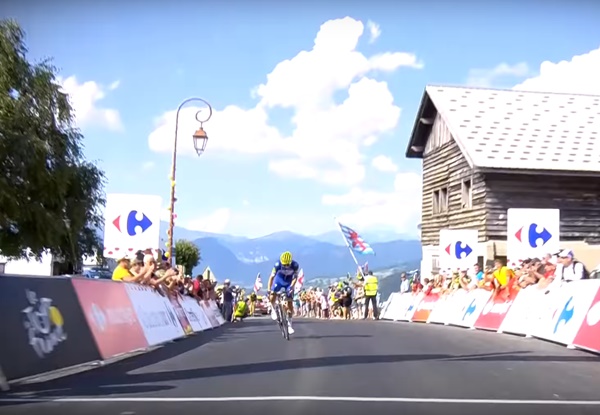
Three week races are to a great extent about pacing yourself, identifying exactly when to use small parcels of energy and when to hold back and see how things pan out. Alaphilippe pretty much took the ‘attack absolutely everyone throughout the entire stage’ approach and while it was very entertaining and effective on the day, it’s not an easy thing to repeat. You get the impression he can’t help himself though.
It was a good day for Greg Van Avermaet too, who wasn’t surrendering the yellow jersey without a fight. ‘You may all climb quicker than me,” he seemed to say, ‘but that won’t mean much if I’m already six minutes up the road come the final ascent.’
You could say it was something of a slight on Van Avermaet’s mountain credentials that all the favourites let him do this, but then stage 11 immediately proved that they were all 100 per cent correct in their assessement, so fair enough really.
Our cast of favourites mostly ended up finishing together, but there were a few exceptions. Bob Jungels, Ilnur Zakarin and Rafal Majka confirmed their ‘outsider’ status by finishing 50s down, while Rigoberto Uran confirmed his ‘2017 was an unusually good year’ status by losing a couple of minutes. A day later, Uran would lose 26 minutes. Another day later, he would abandon the race, citing injuries sustained on the cobbled stage.
Random stage 10 highlight: Chris Froome got a puncture on the gravel bit and tried to swap wheels with Jonathan Castroviejo, only to realise that Castroviejo also had a puncture.
Geraint Thomas enjoys the first summit finish
Stage 11 was a short, high speed 108km skip to La Rosiere that saw Team Sky flexing their finances, the team’s workhorses setting that familiar pace that only the very strongest of the overall contenders can stay with.
Eventually, they ran out of labourers and were just left with their team leaders – who finished first and third. The benefit of having both Geraint Thomas and Chris Froome up there was that they could take it in turns to say “I’m not riding on the front of the group because my team-mate’s ahead/behind”. Whichever of them was being a lazy bones would then attack whenever the rider they were sitting behind started to tire.
It was bad manners, but good tactics.
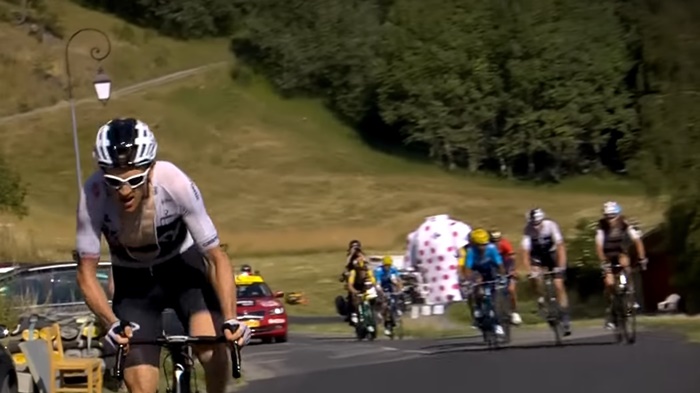
The end result was that there were quite a lot of time gaps come the finish. Between this and the following day of racing up to Alpe d’Huez, the overall contenders have basically ended up whittled down to Thomas, Froome and Tom Dumoulin with Romain Bardet, Primoz Roglic and Mikel Landa a little off the pace. Everyone else seems out of it.
Geraint Thomas enjoys the second summit finish
Ironically – given that Fernando Gaviria, Dylan Groenewegen and Andre Greipel joined Mark Cavendish and Marcel Kittel in departing the race – stage 12 ended in a sprint. It wasn’t exactly a bunch sprint though. It was just five guys on their last legs, of whom Geraint Thomas was again the strongest.
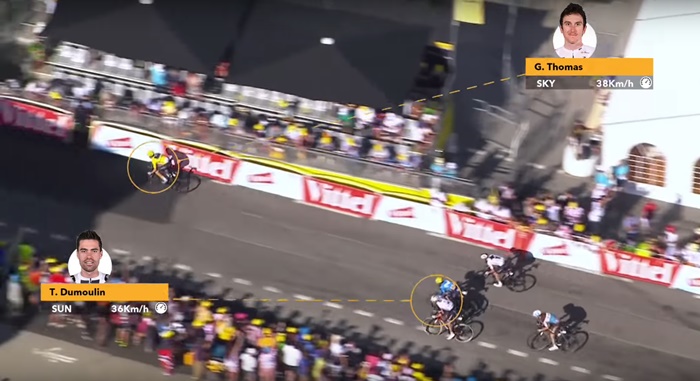
The five guys had actually been four guys – Thomas, Froome, Dumoulin and Bardet – but then Mikel Landa materialised a few hundred metres from the finish. On first viewing, I assumed he’d travelled through some sort of portal – which would be very useful and I thought if he gets the chance to use that again, he definitely should (unless it always leads to the upper slopes of Alpe d’Huez, in which case he definitely shouldn’t). On second viewing, Landa was a little way behind them all along. Apparently I’m not very observant.
The name missing from that group is of course Vincenzo Nibali. He was actually only a few seconds adrift, but we now know that he was riding with a fractured vertebra. About 4km from the summit, the road narrowed; police motorbikes slowed and veered; fans loomed in bearing flags and smoke torch things; and someone inadvertently hooked his bike with what looked to be a camera strap.
Nibali abandoned, but not without riding those final 4km quicker than you or almost anyone else ever could.
So what sprinters are actually left then?
Peter Sagan, obviously. He won stage 13 ahead of Alexander Kristoff who is also second in the points competition.
Kristoff has fewer than half the points of Sagan, so barring a crash or being kicked off the race, Sagan’s got the green jersey sewn up (which is a very foolish piece of needlework because he’ll need to climb into it daily from now until Paris).
Le Cote de Cummings
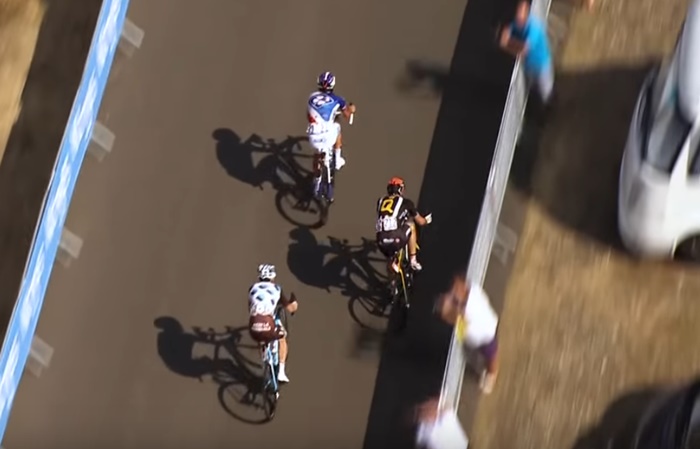
Remember when Steve Cummings whooshed past Romain Bardet and Thibaut Pinot at the top of the Côte de la Croix Neuve in 2015? That was amazing. Alas, Cummings wasn’t selected for his team this year, so it was left to someone else to make something of that hill’s viciously steep slopes on stage 14.
The stage was won by Spanish rider Omar Fraile about 20 minutes before the favourites even turned up (there’d been a sizeable and committed break (which almost inevitably included Peter Sagan)).
When the yellow jersey race finally did take place, my outside tip Primoz Roglic gained a handful of seconds on everyone using his ski jump thighs. The results were very predictable from then on. Thomas, Froome and Dumoulin – the top three – finished together and everyone else was to a greater or lesser extent off their pace.
Gianni Mosgone
There were a few moments on stage 15 where something threatened to happen, but then it never actually did, so this was kind of an inconsequential stage (except insofar as it’s another one Geraint Thomas no longer has to worry about losing time on).
The most eye-catching development was probably Team Sky’s Gianni Moscon getting binned off the race for backhanding another rider inside the first kilometre.
It’s hard to avoid the conclusion that the Italian rider is kind of a wanker. The team suspended him for six weeks for racial abusing Kevin Reza during last year’s Tour de Romandie. Reza’s team-mate Sebastian Reichenbach later claimed that Moscon had deliberately caused him to crash because he’d tweeted about the incident. Moscon was cleared due to a lack of evidence.
Anyway, as we head into the final week, here’s the top ten.
Could Geraint Thomas win the Tour de France?
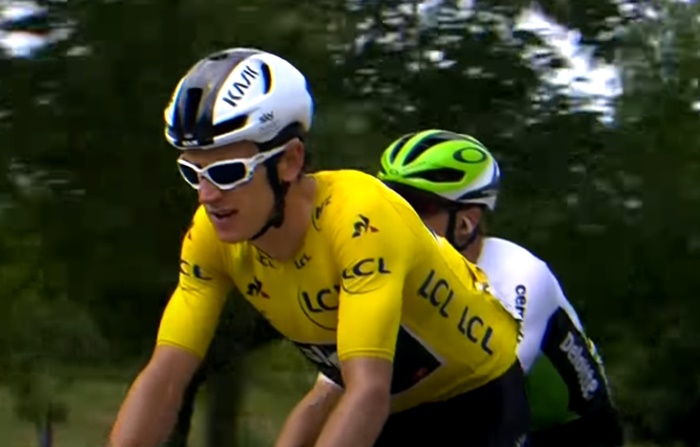
This seems an obvious question to ask at this point. The answer is yes, he could.
If you then ask ‘will Geraint Thomas win the Tour de France?’ the answer is, ‘God, I dunno. Maybe?’
For his part, the Welshman is still deferring to Froome as ‘team leader’. It makes sense. Chris Froome wins three-week races more often than not, while for all that he’s good at each of the component parts of Grand Tour riding, Thomas has never even finished in the top ten.
So there are two questions here:
- Will Geraint Thomas come to a bit of a standstill in the Pyrenees and tumble down the general classification? (Because historically that’s the kind of thing that tends to happen to him)
- Will Chris Froome’s Giro d’Italia-winning efforts finally catch up with him?
Different permutations of yes and no for those two questions would result in a Thomas victory, a Froome victory or a victory for someone else.
A ‘no’ to both questions would make things interesting. My guess is that they’ll keep taking it in turns to attack Dumoulin while the other sits on his wheel. If at some point the Dutchman fails to chase an attack down, that Team Sky rider will have free rein to take as much time as he can.
This is very much a hypothetical scenario though because Dumoulin currently looks more than capable of chasing everything down and then some.
Asked today whether he would sacrifice his hopes of a fifth Tour victory to help Thomas, Froome said: “Yes.”
The final week
The Pyrenees are by and large more irregular than the Alps, so they sometimes suit a different sort of rider.
Stage 16 (Tuesday) features three climbs towards the end of the stage and three twisty-turny descents.
Stage 17 (Wednesday) is absolutely bonkers. Just 65km long, it is basically just three climbs and everyone’s going to be firing off at a million miles an hour from the start because the stage is so short. This next bit sounds like a joke, but it isn’t. They’re starting the riders in a grid, like in motorsport.
Stage 18 (Thursday) is flat.
Stage 19 (Friday) is 200km with quite a lot of climbs, two of which are ‘beyond classification’. It’s downhill to the line.
Stage 20 (Saturday) is a very spiky 31km time trial. It is not one for the big time trial specialists.
Stage 21 (Sunday) is leisurely glasses of Champagne and then a short bit of ragging around Paris before the very final sprint.
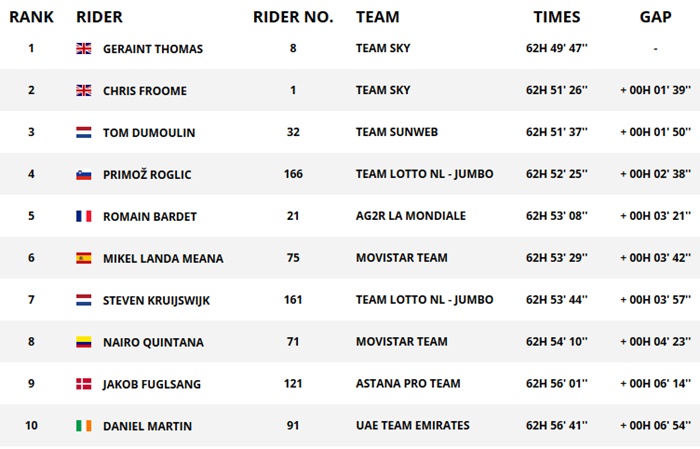
Leave a Reply